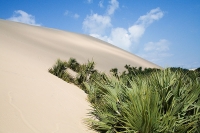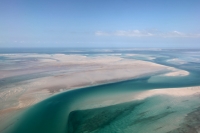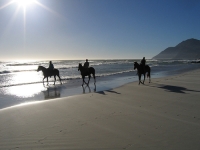Bazaruto Archipelago Travel Guide
Consisting of six islands off the coast of Vilanculos, in Mozambique's Inhambane Province, the Bazaruto Archipelago is the most popular tourist area in the country and widely considered to be the 'Pearl of the Indian Ocean'.
It's a luxury destination sought after by divers, fishermen, nature lovers, and sun seekers. The main islands of Bazaruto and Benguerra, as well as the smaller Santa Carolina, Magaruque, Bangue and Pansy Shell Island are all protected within a national park, one of the largest of its kind in the Indian Ocean.
The warm seas are home to whales, dolphins, manta rays, turtles, and the endangered dugong. Unspoilt coral reefs attract this rich marine life, providing underwater enthusiasts with top-class scuba diving and snorkelling adventures.
On land, miles of deserted beaches stretch beneath the shade of palm trees, offering weary city executives a dream getaway. The most stressful thing is deciding between activities like birdwatching, fishing, and simply soaking up rays of sunshine.
The largest island is the popular Bazaruto, which gives the archipelago its name. To the west is the smallest island, Santa Carolina, nearly two miles (3km) long and less than half a mile (500m) wide, surrounded by protected coral reefs and deep water suited to big game fishing.
A narrow channel separates Bazaruto from its southern neighbour Benguela, second largest in the chain, followed by Magaruque, which is primarily a diving resort. Travellers can also explore the tiny uninhabited island of Bangue when travelling from Bangue.
Things to do in Bazaruto Archipelago
The Bazaruto Archipelago is the most popular tourist destination in Mozambique and offers a plethora of fun ocean activities as well as stunning surroundings to enjoy while doing absolutely nothing. The islands are famous scuba diving and fishing destinations, and visitors without diving expertise can enjoy glorious snorkelling along the pristine coral reefs. Various watersports are possible, including sailing, water skiing, kayaking and wind surfing, and conditions are wonderful for swimming. The water is pleasantly warm all year. Land-based activities include horse riding along the beach, bird watching, hiking along dramatic sand dunes, 4x4 safaris to explore the island landscapes, and, of course, sun bathing.
Travellers tend to arrive in Vilanculos (there is an international airport just outside the town) and are ferried across to the islands in traditional dhows. The town of Vilankulo, or Vilanculos, is worth exploring, with a bustling central market and some good bars, restaurants and shops, giving tourists a taste of local culture. Many choose to stay in or near the town on the mainland and enjoy daytrips to the various islands, but there are luxury resorts to luxuriate at within the archipelago.

Bazaruto Island
The largest island in the archipelago, Bazaruto Island is about 23 miles (37km) long and four miles (7km) wide, surrounded by magnificent stretches of white sand. Enormous sand dunes comprise the eastern strip, while the interior contains large freshwater lakes inhabited by crocodiles and frequented by a wide variety of water birds, including flamingos. On the northern tip of the island is a lighthouse built by the Portuguese over 100 years ago, which signals to the large number of ships travelling the historic Mozambique Channel and affords spectacular views from its tower. World famous for its large game fishing, Bazaruto is a popular diving destination with a rich variety of marine life surrounding the island. The Bazaruto Marine National Park offers coral reefs, crystal-clear waters, and diverse underwater life. Reef sharks, dolphins, manta rays, and turtles are regular visitors to these waters, and the turtles lay their eggs on the beaches of the island. Humpback whales can be found between August and October, and whale sharks between April and July. Tourist facilities, upmarket lodges, and exclusive resorts dot the island and most gear themselves towards luxury tourism. Bazaruto is accessible by boat or plane from Vilanculos.

Benguerra Island
Benguerra is the second largest island of the Bazaruto Archipelago, less than half a mile (1km) south of Bazaruto. Like its neighbour, Benguerra boasts stunning beaches, large sand dunes, and freshwater lakes. Its forest and wetland areas attract a huge variety of birds and animals, while its surrounding reefs offer some of the best diving and snorkelling opportunities on the African continent. Two-mile Reef is to the east of Benguerra. Its protected lagoon, known aptly as the Aquarium, is an underwater paradise with beautiful corals and a wealth of tropical fish, popular with both divers and snorkellers. People will find the famous Pansy shells along the sandbanks to the north of the island. Most visitors go to Benguerra for the big game fishing as its deep waters teem with the likes of marlin and barracuda. The area is world-renowned as a sport fishing destination and is accessible by boat or plane from Vilanculos. Happily, there's plenty of accommodation on the island. Tourist facilities are good, with a number of upmarket lodges and exclusive resorts geared towards luxury tourism. Benguerra is a popular honeymoon destination and remains an unspoilt natural paradise, fast becoming one of the best luxury beach destinations in Africa.

Vilanculos
Vilanculos is a popular tourist destination and the gateway to the Bazaruto Archipelago, a group of islands incorporated into Mozambique's stunning underwater national park. Visitors on day trips from the town are encouraged to go scuba diving and snorkelling in the clear waters. There's also the chance to go horse riding along the unspoilt beaches of the Vilanculos coast. Sailing around the archipelago in a traditional dhow is a great way to enjoy the azure ocean waves, sandy beaches, palm trees, and coral reefs of the islands. Vilanculos is also a great fishing area, ranked as the best black marlin destination in the eastern Indian Ocean. The region is best explored on foot, offering a number of good restaurants, a few bars and shops, and a central market in the village of Vilankulo. Although it has been experiencing a tourism boom and has decent amenities and great accommodation options, it has retained its local flavour. There is even a new international airport on the outskirts of town, with flights to both Johannesburg and Maputo.
Mozambique travel info
Electricity
Electrical current is 220 volts, 50Hz. The rounded three-pin plug is common, particularly near the border with South Africa and in Maputo. Two pronged, round- and flat-pin plugs are also found.
Language
Portuguese is the official language, though over 40 languages are spoken in the country. English is taught in secondary schools, but is only spoken in the southern tourist regions.
Money
The official currency is the Mozambican Metical (MZN), which is divided into 100 centavos. In the southern parts of the country, South African rands and US dollars are often also accepted to pay for accommodation. It's prudent to carry some cash is these currencies for times when an ATM is out of order or nonexistent. Credit cards are accepted in most upmarket hotels in Maputo, but card facilities throughout the rest of the country are limited so, again, it's advisable to carry cash.
Tipping
Tipping has become standard practice in Mozambique, particularly in tourist areas where a tip of about 10 percent is expected in restaurants.
Health
Health regulations in Mozambique require visitors to have a yellow fever certificate if travelling from infected areas. Malaria is a risk throughout the year and prophylactics are recommended, as well as precautions against mosquitos.
Vaccinations are recommended for hepatitis A, hepatitis B, and typhoid. Visitors who will be spending a lot of time outdoors and may be at risk of animal bites should consider a rabies vaccination. All eligible travellers should be up to date with their COVID-19 vaccines.
Diseases caused by unsanitary conditions are common throughout the country, and untreated water should be considered as unsafe to drink. Cholera and other waterborne diseases are prevalent during the rainy season.
The government has declared tuberculosis (TB) a national emergency and expects it to be a problem for the foreseeable future. Hospital facilities are generally poor in Mozambique, and outside the major cities of Maputo and Beira medical facilities are limited.
Comprehensive medical insurance is essential and visitors should carry personal medical supplies with them. Visitors should make sure that all medication is in its original packaging and accompanied by a signed and dated letter from a doctor, detailing what the medication is and why it is needed.
Safety
Most visits to Mozambique are trouble free, but tourists should remain vigilant at all times. Violent crime can occur in major cities and tourist areas, and there is some mugging, bag snatching, and pick-pocketing. Visitors are advised to be alert in public places, to keep valuables out of sight, and to avoid walking anywhere at night. All visitors, especially women, should avoid walking alone on the beach, as beaches and offshore islands are not policed.
Visitors are advised that it is extremely risky to wander off well-travelled paths and roads, as a few unexploded landmines still lie scattered about the southern parts of the country. Local information should be sought before going off-road outside provincial capitals.
Travellers should remain vigilant when driving, as traffic accidents are common due to the poor condition of the roads. Many roads can become impassable in the rainy season (November to April), when there is also a risk of cyclones. Overland travel after dark is not recommended, and travellers should be especially alert when driving near the Mozambique-South African border. Police checkpoints are common, where foreigners may be at risk of harassment. There have been many reports of police attempting to solicit bribes, but travellers should insist on a written citation that can be paid at a police station. Travellers should also not travel to some northern districts in Cabo Delgado Province due to terrorism.
Local customs
Identity documents should be carried at all times; drug offences are taken very seriously, and can receive long jail terms and heavy fines. Visitors should ask permission before photographing anyone, particularly in remote parts of the country.
Doing business
Conducting business in Mozambique can be difficult, as many people only speak Portuguese or their own ethnic language. Translators are usually found in Maputo, but remain hard to come by. Punctuality is important and dress is usually conservative, with lightweight materials recommended.
Business associates should be addressed by their professional titles unless otherwise stated, and meetings generally start and end with a handshake. Men and women may shake hands, but any additional physical contact can be interpreted as romantic interest.
Duty free
Travellers to Mozambique may enter the country with the following items without incurring customs duty: 200 cigarettes or 250g of tobacco, perfume for personal use, and 750ml of spirits or three standard bottles of wine. Drugs are strictly prohibited and a permit is required for firearms and ammunition.
Communications
The international dialling code for Mozambique is +258. The outgoing code is 00 followed by the relevant country code (e.g. 0027 for South Africa). Internet access is easy and fast in Maputo and other major centres; upmarket hotels offer WiFi. Mobile coverage is expanding to all main cities in most provinces.
Passport & Visa
All foreign passengers to Mozambique must hold return or onward tickets, the necessary travel documentation for their next destination, and proof of sufficient funds to cover their expenses while in the country. Until recently visitors of most nationalities could obtain a 30-day tourist visa on arrival in Mozambique, but visas can now no longer be purchased at points of entry and must be organised beforehand. Those visiting Mozambique from a country where there is no Mozambican diplomatic mission should be able to get a visa on arrival but this should be confirmed in advance. A yellow fever vaccination certificate is required to enter Mozambique if visitors are arriving from or have transited through an infected area. It is highly recommended that travellers' passports have at least six months' validity remaining after the intended date of departure from their travel destination. Immigration officials often apply different rules to those stated by travel agents and official sources.
Entry requirements
US citizens must have a passport that is valid on arrival in Mozambique. A visa is required.
British citizens must have a passport that is valid on arrival in Mozambique. A visa is required.
Canadian citizens must have a passport that is valid on arrival in Mozambique. A visa is required.
Australian citizens must have a passport that is valid on arrival in Mozambique. A visa is required.
South African citizens must have a passport that is valid for at least 30 days after their arrival in Mozambique. No visa is required.
Irish citizens must have a passport that is valid on arrival in Mozambique. A visa is required.
New Zealand citizens must have a passport that is valid on arrival in Mozambique. A visa is required.
Useful contacts
Department of Tourism official site: www.visitmozambique.net
Fire (198), medical emergencies (117), police (119).Embassies / consulates in other countries
Mozambique Embassy, Washington DC, United States (also responsible for Canada): +1 202 293 7146
Mozambique High Commission, London, United Kingdom: +44 (020) 7383 3800
Consulate in Melbourne, Australia: +61 3 9652 9000
Mozambique High Commission, Pretoria, South Africa: +27 12 401 0300
Embassies / consulates in Mozambique
United States Embassy, Maputo: +258 21 492 797
British High Commission, Maputo: +258 21 356 000
Canadian High Commission, Maputo: +258 21 244 200
Australian Consulate, Maputo: +258 21 498 778
South African High Commission, Maputo: +258 21 243 000
Irish Embassy, Maputo: +258 (0)1 491 440
New Zealand High Commission, Pretoria, South Africa (also responsible for Mozambique): +27 12 435 9000



